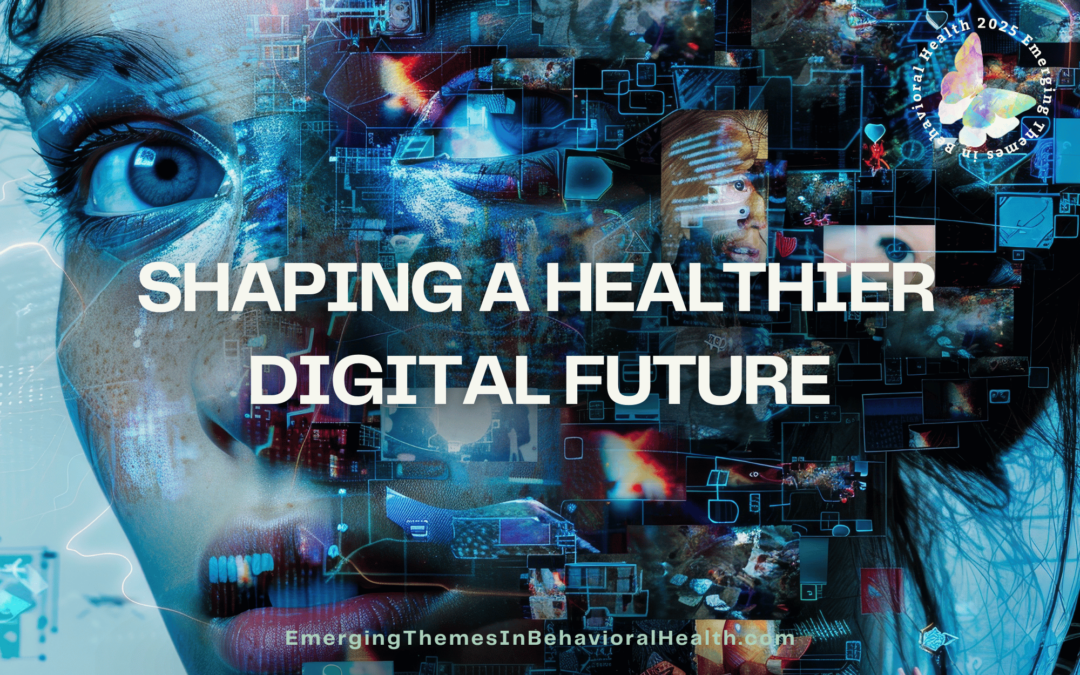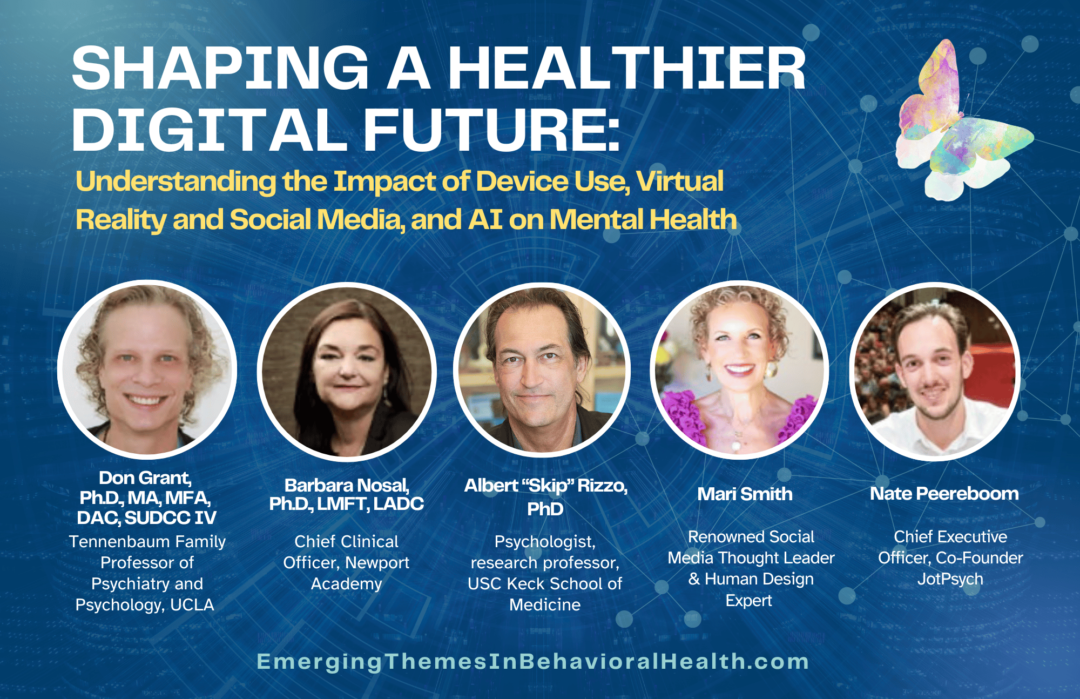In a world where technology is woven into nearly every aspect of our lives, conversations about its effects on mental health are more critical than ever. From the rise of social media-driven anxiety to the impact of caregivers’ screen use on child development, digital devices are influencing emotional well-being in ways we are only beginning to understand.
At the same time, technology is also being used to advance mental health care, with innovations like virtual reality (VR) therapy offering new ways to treat trauma, anxiety, and phobias. The challenge we now face is how to harness the power of digital tools while minimizing their risks—a balance that researchers, clinicians, and tech developers are actively working to achieve.
This article explores the dual role of technology in mental health—how social media and device use can be both helpful and harmful and how emerging innovations like VR therapy are shaping the future of behavioral health.
How Caregivers’ Device Use Affects Child Development
Smartphones, tablets, and constant notifications have fundamentally changed how we interact with each other, including within families. While much attention has been given to children’s screen time, researchers are now looking at how caregivers’ device use influences a child’s emotional and social development.
📌 Key Concerns:
- When caregivers are frequently distracted by their devices, children may experience delayed emotional development and weaker attachment bonds.
- Studies suggest that caregiver responsiveness is key to a child’s sense of security—excessive screen use can disrupt these essential interactions.
- Long-term consequences may include heightened anxiety, attention difficulties, and challenges in social-emotional learning.
Dr. Don Grant, Ph.D., and Dr. Barbara Nosal, Ph.D., are leading voices in this field, exploring the psychological effects of digital distractions on family dynamics. Their work highlights the need for healthy device-use boundaries, emphasizing that mindful presence—not just physical presence—is key to strong parent-child relationships.
Virtual Reality: A New Frontier for Mental Health Treatment
While some forms of technology pose challenges to mental well-being, others are proving to be powerful tools for healing. One of the most promising innovations is virtual reality (VR)-assisted therapy, which is already being used to treat PTSD, phobias, and anxiety disorders.
📌 How Virtual Reality is Transforming Therapy:
- Exposure therapy in a controlled environment – VR allows patients to gradually confront fears in a safe and immersive digital setting.
- PTSD treatment for veterans and trauma survivors – Studies show that VR therapy can help patients process traumatic memories with greater emotional regulation.
- Anxiety and stress reduction – Guided VR meditation and relaxation experiences are helping patients develop calming techniques in real-time scenarios.
Dr. Albert “Skip” Rizzo, a pioneer in the field of clinical virtual reality, is leading research on how VR can revolutionize behavioral health treatments. His work explores how immersive experiences can activate the brain in unique ways, making therapy more engaging, effective, and accessible.
“Social media platforms are psychologically designed to create highly addictive behavior. Over time, if we’re not careful, what’s come to be known as “brain rot” creeps in as we mindlessly consume endless rivers of nonsense content. We get mental exhaustion, brain fog, lose focus and lack productivity. Yet we still crave the next dopamine “hit.” –– Mari Smith
The Social Media Dilemma: Connection or Isolation?
Social media platforms were designed to keep us connected, yet research suggests they may be doing the opposite—leading to higher rates of loneliness, anxiety, and depression.
📌 Key Issues with social media and Mental Health:
- The dopamine effect: Social platforms use engagement-driven algorithms to keep users scrolling, which can reinforce addictive behaviors.
- Comparison culture: Users are constantly exposed to curated versions of reality, which can fuel body image concerns, low self-esteem, and FOMO (fear of missing out).
- Disrupted sleep and focus: Studies link excessive social media use to poor sleep quality, reduced attention spans, and increased stress levels.
According to Mari Smith, a leading expert on social media psychology, while digital platforms can provide meaningful community and support, they also come with risks that need to be navigated carefully. Experts recommend intentional social media use, including screen time limits, curated content consumption, and regular digital detoxes to mitigate negative mental health impacts.
Artificial Intelligence: Enhancing Behavioral Health Care
As technology continues to evolve, artificial intelligence (AI) is emerging as a transformative tool in behavioral health, improving diagnosis, treatment, and patient support. AI-powered tools are helping clinicians make more informed decisions, streamline workflows, and provide greater accessibility to mental health care.
📌 How AI is Revolutionizing Mental Health Treatment:
- Early Detection & Diagnosis – AI-driven algorithms analyze speech patterns, facial expressions, and behavioral data to identify early signs of mental health conditions such as depression and anxiety.
- Personalized Treatment Plans – Machine learning models can assess vast amounts of patient data, helping clinicians tailor interventions and predict treatment responses with greater accuracy.
- AI-Powered Chatbots & Virtual Therapists – Platforms like AI-driven mental health apps provide 24/7 support, guiding users through CBT-based exercises, mindfulness practices, and crisis interventions.
- Reducing Clinician Burnout – AI automates administrative tasks like progress tracking and appointment scheduling, allowing therapists to focus on patient care rather than paperwork.
While AI will never replace human connection in therapy, it is proving to be a valuable tool for expanding access, improving accuracy, and enhancing mental health support for individuals worldwide.
Nate Peereboom is the CEO of JotPsych. JotPsych is a best-in-class AI-scribe for behavioral health clinicians. The software reduces documentation time by ~90% for psychiatrists, PMHNPs, psychologists, counselors, and therapists. Since its commercial launch 16 months ago, JotPsych has scribed for over 700,000 patient encounters across the US, Canada, EU, Australia, and New Zealand.
Finding Balance in a Digital World
Technology itself isn’t inherently good or bad—it’s how we use it that determines its impact. The key to shaping a healthier digital future lies in:
✔ Establishing mindful device use habits, especially for caregivers and children.
✔ Understanding social media’s psychological effects and creating intentional usage patterns.
✔ Leveraging new technology, like VR, to enhance mental health care rather than detract from it.
As digital tools continue to evolve, so must our approach to mental well-being in a tech-driven world. By setting healthy boundaries, prioritizing human connection, and using innovations for good, we can create a future where technology enhances mental health rather than undermines it.
What Can We Do Next?
Mental health professionals, parents, educators, and tech developers must work together to promote responsible technology use. Ongoing research, open discussions, and evidence-based interventions will be critical in navigating the challenges and opportunities that digital advancements bring.
Join the Conversation
For deeper insights into these topics, Emerging Themes in Behavioral Health 2025 will feature experts like Dr. Skip Rizzo, Mari Smith, Dr. Don Grant, and Dr. Barbara Nosal, discussing the evolving relationship between technology and mental health. Learn More


